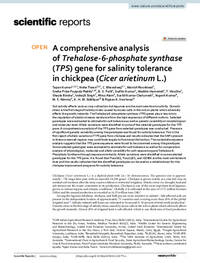A comprehensive analysis of Trehalose-6-phosphate synthase (TPS) gene for salinity tolerance in chickpea (Cicer arietinum L.)

Authors:
Soil salinity affects various crop cultivation but legumes are the most sensitive to salinity. Osmotic stress is the first stage of salinity stress caused by excess salts in the soil on plants which adversely affects the growth instantly. The Trehalose-6-phosphate synthase (TPS) genes play a key role in the regulation of abiotic stresses resistance from the high expression of different isoform. Selected genotypes were evaluated to estimate for salt tolerance as well as genetic variability at morphological and molecular level. Allelic variations were identified in some of the selected genotypes for the TPS gene. A comprehensive analysis of the TPS gene from selected genotypes was conducted. Presence of significant genetic variability among the genotypes was found for salinity tolerance. This is the first report of allelic variation of TPS gene from chickpea and results indicates that the SNPs present in these conserved regions may contribute largely to functional distinction. The nucleotide sequence analysis suggests that the TPS gene sequences were found to be conserved among the genotypes. Some selected genotypes were evaluated to estimate for salt tolerance as well as for comparative analysis of physiological, molecular and allelic variability for salt responsive gene Trehalose-6-Phosphate Synthase through sequence similarity. Allelic variations were identified in some selected genotypes for the TPS gene. It is found that Pusa362, Pusa1103, and IG5856 are the most salt-tolerant lines and the results indicates that the identified genotypes can be used as a reliable donor for the chickpea improvement programs for salinity tolerance.
